HNB1205 Essay: Medication Safety, Causes, Effects, and Strategies
VerifiedAdded on 2022/09/28
|7
|1582
|24
Essay
AI Summary
This essay, written for a Foundations of Nursing 2 course, delves into the critical issue of medication errors within the healthcare industry. It begins by defining medication errors and identifying their primary sources, including inadequate knowledge, poor communication, and system-related issues such as work environment, computerized information systems, and medication-related factors. The essay then explores the significant effects of these errors on both patients, including physical, emotional, and financial consequences, and healthcare providers, highlighting the psychological impact and potential legal ramifications. Furthermore, the essay discusses strategies to minimize medication errors, referencing the Australian Commission on Safety and Quality in Health Care's standards and criteria for medication management. It emphasizes the importance of clinical governance, documentation, and standardized processes to improve patient safety and reduce the prevalence of medication errors.
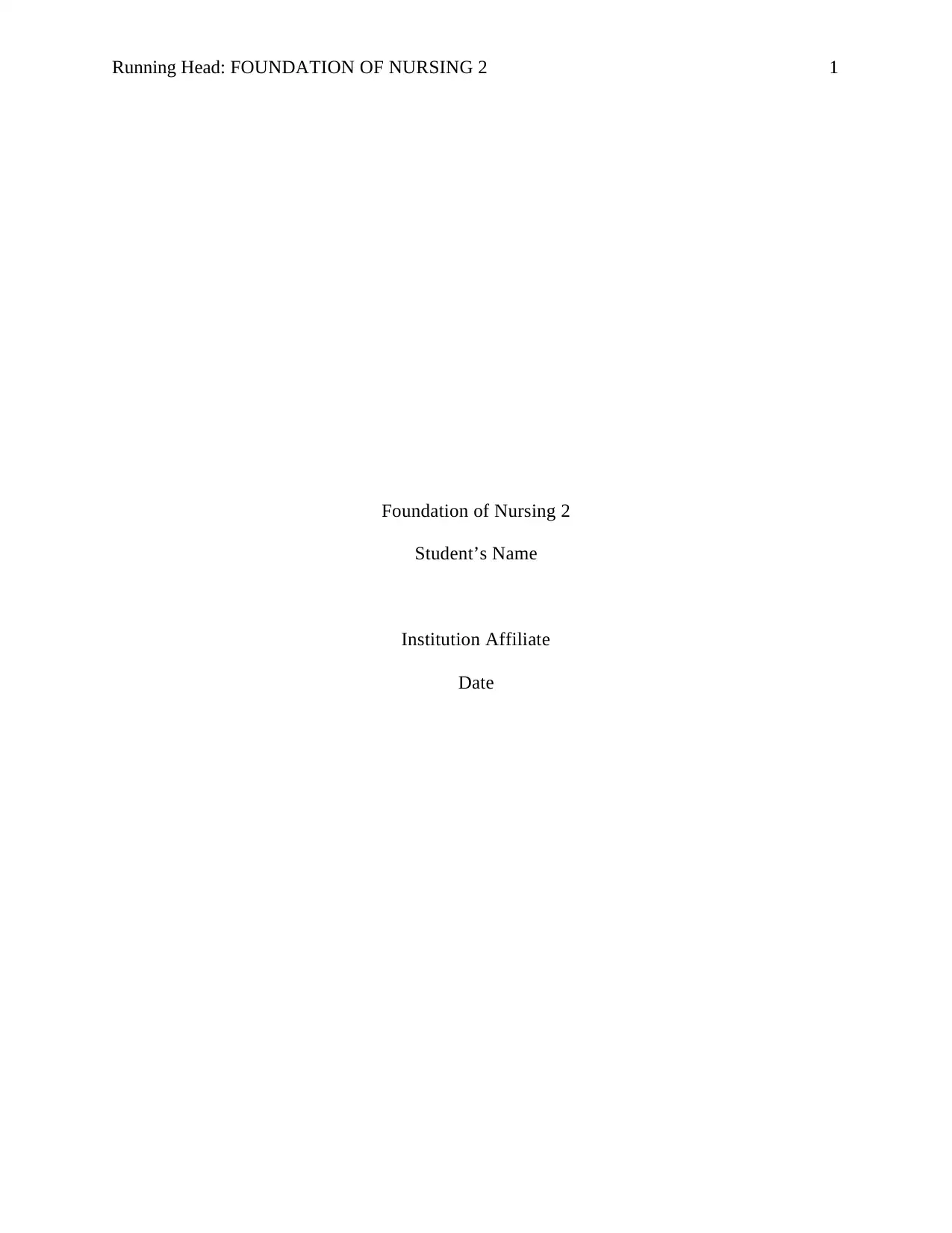
Running Head: FOUNDATION OF NURSING 2 1
Foundation of Nursing 2
Student’s Name
Institution Affiliate
Date
Foundation of Nursing 2
Student’s Name
Institution Affiliate
Date
Paraphrase This Document
Need a fresh take? Get an instant paraphrase of this document with our AI Paraphraser
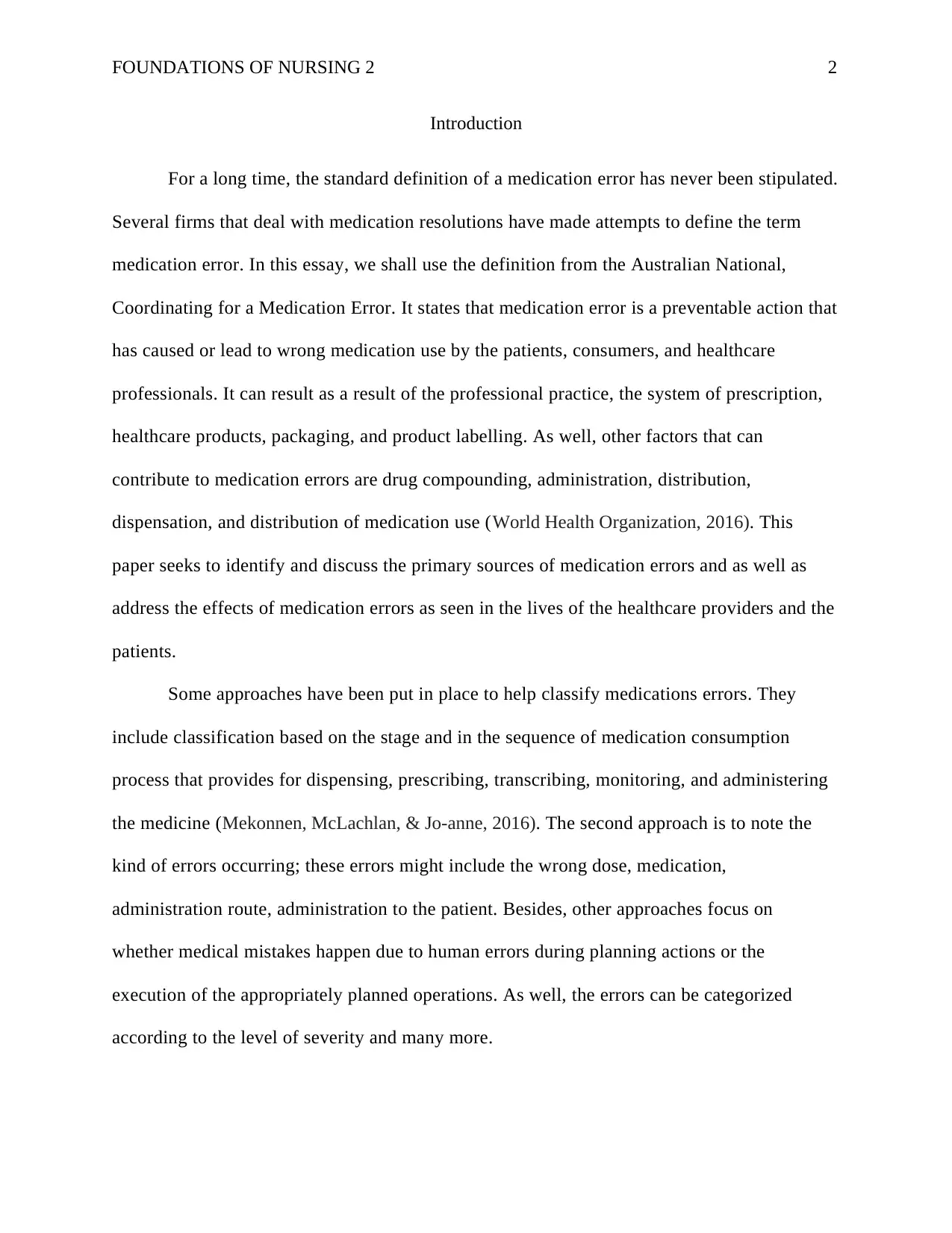
FOUNDATIONS OF NURSING 2 2
Introduction
For a long time, the standard definition of a medication error has never been stipulated.
Several firms that deal with medication resolutions have made attempts to define the term
medication error. In this essay, we shall use the definition from the Australian National,
Coordinating for a Medication Error. It states that medication error is a preventable action that
has caused or lead to wrong medication use by the patients, consumers, and healthcare
professionals. It can result as a result of the professional practice, the system of prescription,
healthcare products, packaging, and product labelling. As well, other factors that can
contribute to medication errors are drug compounding, administration, distribution,
dispensation, and distribution of medication use (World Health Organization, 2016). This
paper seeks to identify and discuss the primary sources of medication errors and as well as
address the effects of medication errors as seen in the lives of the healthcare providers and the
patients.
Some approaches have been put in place to help classify medications errors. They
include classification based on the stage and in the sequence of medication consumption
process that provides for dispensing, prescribing, transcribing, monitoring, and administering
the medicine (Mekonnen, McLachlan, & Jo-anne, 2016). The second approach is to note the
kind of errors occurring; these errors might include the wrong dose, medication,
administration route, administration to the patient. Besides, other approaches focus on
whether medical mistakes happen due to human errors during planning actions or the
execution of the appropriately planned operations. As well, the errors can be categorized
according to the level of severity and many more.
Introduction
For a long time, the standard definition of a medication error has never been stipulated.
Several firms that deal with medication resolutions have made attempts to define the term
medication error. In this essay, we shall use the definition from the Australian National,
Coordinating for a Medication Error. It states that medication error is a preventable action that
has caused or lead to wrong medication use by the patients, consumers, and healthcare
professionals. It can result as a result of the professional practice, the system of prescription,
healthcare products, packaging, and product labelling. As well, other factors that can
contribute to medication errors are drug compounding, administration, distribution,
dispensation, and distribution of medication use (World Health Organization, 2016). This
paper seeks to identify and discuss the primary sources of medication errors and as well as
address the effects of medication errors as seen in the lives of the healthcare providers and the
patients.
Some approaches have been put in place to help classify medications errors. They
include classification based on the stage and in the sequence of medication consumption
process that provides for dispensing, prescribing, transcribing, monitoring, and administering
the medicine (Mekonnen, McLachlan, & Jo-anne, 2016). The second approach is to note the
kind of errors occurring; these errors might include the wrong dose, medication,
administration route, administration to the patient. Besides, other approaches focus on
whether medical mistakes happen due to human errors during planning actions or the
execution of the appropriately planned operations. As well, the errors can be categorized
according to the level of severity and many more.
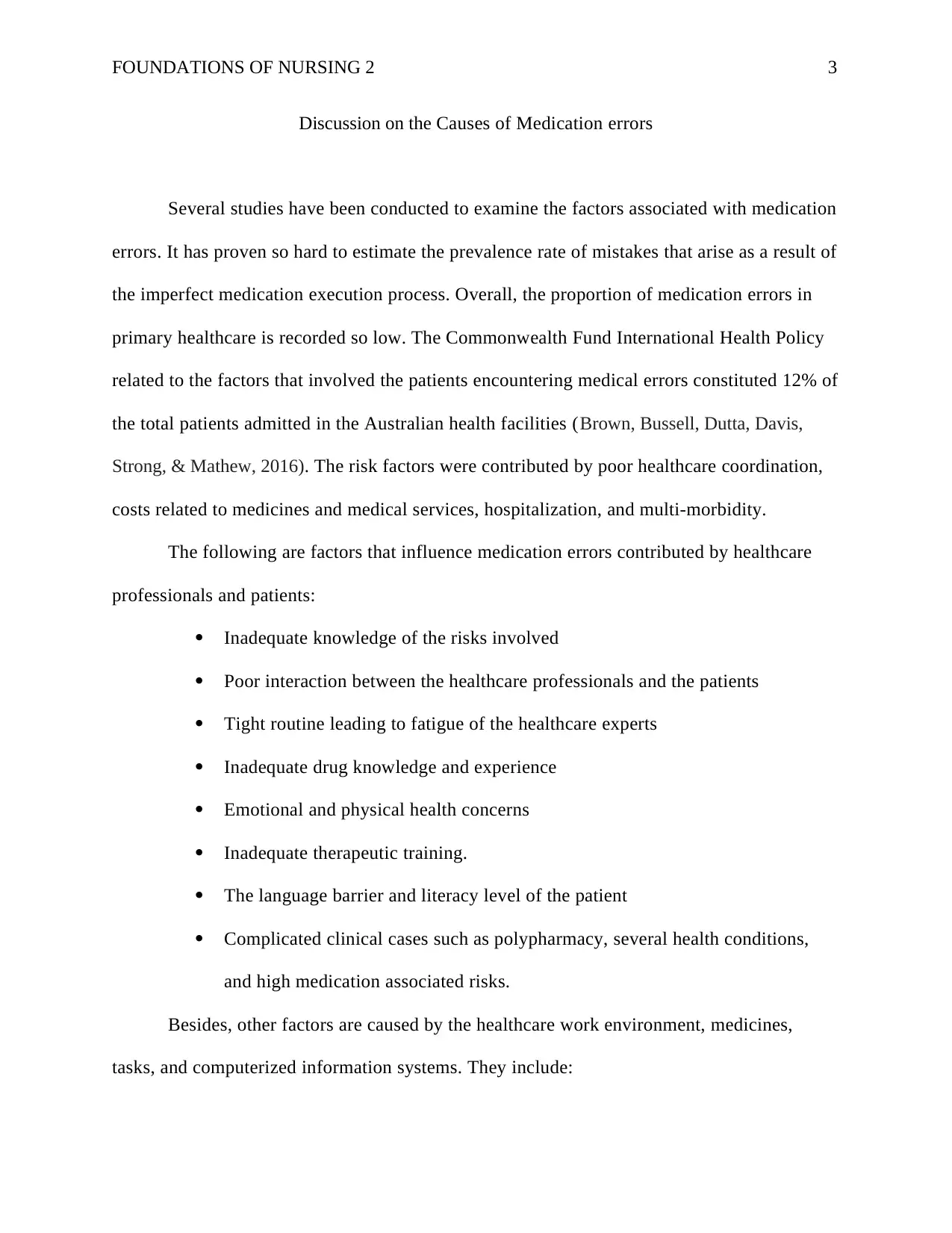
FOUNDATIONS OF NURSING 2 3
Discussion on the Causes of Medication errors
Several studies have been conducted to examine the factors associated with medication
errors. It has proven so hard to estimate the prevalence rate of mistakes that arise as a result of
the imperfect medication execution process. Overall, the proportion of medication errors in
primary healthcare is recorded so low. The Commonwealth Fund International Health Policy
related to the factors that involved the patients encountering medical errors constituted 12% of
the total patients admitted in the Australian health facilities (Brown, Bussell, Dutta, Davis,
Strong, & Mathew, 2016). The risk factors were contributed by poor healthcare coordination,
costs related to medicines and medical services, hospitalization, and multi-morbidity.
The following are factors that influence medication errors contributed by healthcare
professionals and patients:
Inadequate knowledge of the risks involved
Poor interaction between the healthcare professionals and the patients
Tight routine leading to fatigue of the healthcare experts
Inadequate drug knowledge and experience
Emotional and physical health concerns
Inadequate therapeutic training.
The language barrier and literacy level of the patient
Complicated clinical cases such as polypharmacy, several health conditions,
and high medication associated risks.
Besides, other factors are caused by the healthcare work environment, medicines,
tasks, and computerized information systems. They include:
Discussion on the Causes of Medication errors
Several studies have been conducted to examine the factors associated with medication
errors. It has proven so hard to estimate the prevalence rate of mistakes that arise as a result of
the imperfect medication execution process. Overall, the proportion of medication errors in
primary healthcare is recorded so low. The Commonwealth Fund International Health Policy
related to the factors that involved the patients encountering medical errors constituted 12% of
the total patients admitted in the Australian health facilities (Brown, Bussell, Dutta, Davis,
Strong, & Mathew, 2016). The risk factors were contributed by poor healthcare coordination,
costs related to medicines and medical services, hospitalization, and multi-morbidity.
The following are factors that influence medication errors contributed by healthcare
professionals and patients:
Inadequate knowledge of the risks involved
Poor interaction between the healthcare professionals and the patients
Tight routine leading to fatigue of the healthcare experts
Inadequate drug knowledge and experience
Emotional and physical health concerns
Inadequate therapeutic training.
The language barrier and literacy level of the patient
Complicated clinical cases such as polypharmacy, several health conditions,
and high medication associated risks.
Besides, other factors are caused by the healthcare work environment, medicines,
tasks, and computerized information systems. They include:
⊘ This is a preview!⊘
Do you want full access?
Subscribe today to unlock all pages.

Trusted by 1+ million students worldwide
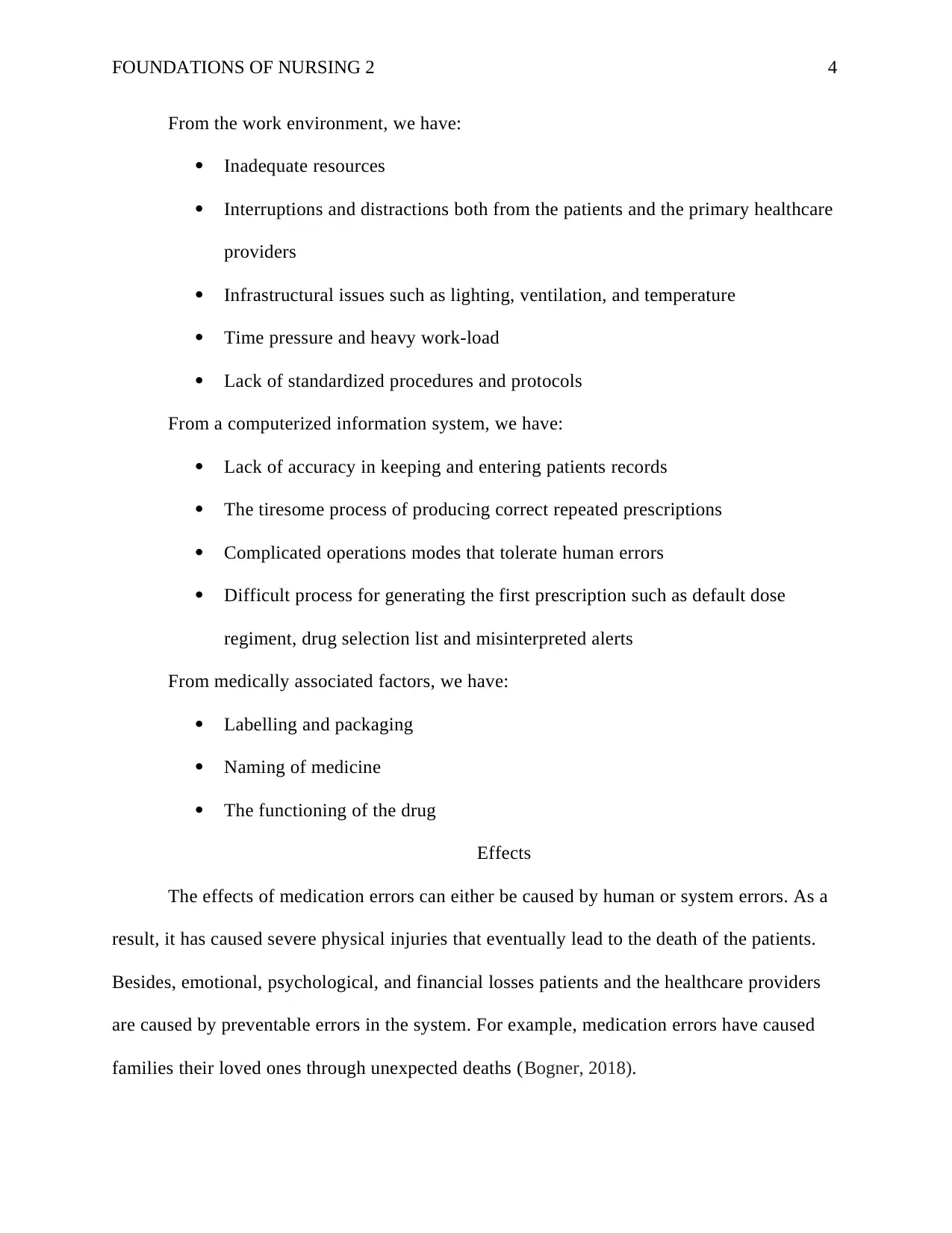
FOUNDATIONS OF NURSING 2 4
From the work environment, we have:
Inadequate resources
Interruptions and distractions both from the patients and the primary healthcare
providers
Infrastructural issues such as lighting, ventilation, and temperature
Time pressure and heavy work-load
Lack of standardized procedures and protocols
From a computerized information system, we have:
Lack of accuracy in keeping and entering patients records
The tiresome process of producing correct repeated prescriptions
Complicated operations modes that tolerate human errors
Difficult process for generating the first prescription such as default dose
regiment, drug selection list and misinterpreted alerts
From medically associated factors, we have:
Labelling and packaging
Naming of medicine
The functioning of the drug
Effects
The effects of medication errors can either be caused by human or system errors. As a
result, it has caused severe physical injuries that eventually lead to the death of the patients.
Besides, emotional, psychological, and financial losses patients and the healthcare providers
are caused by preventable errors in the system. For example, medication errors have caused
families their loved ones through unexpected deaths (Bogner, 2018).
From the work environment, we have:
Inadequate resources
Interruptions and distractions both from the patients and the primary healthcare
providers
Infrastructural issues such as lighting, ventilation, and temperature
Time pressure and heavy work-load
Lack of standardized procedures and protocols
From a computerized information system, we have:
Lack of accuracy in keeping and entering patients records
The tiresome process of producing correct repeated prescriptions
Complicated operations modes that tolerate human errors
Difficult process for generating the first prescription such as default dose
regiment, drug selection list and misinterpreted alerts
From medically associated factors, we have:
Labelling and packaging
Naming of medicine
The functioning of the drug
Effects
The effects of medication errors can either be caused by human or system errors. As a
result, it has caused severe physical injuries that eventually lead to the death of the patients.
Besides, emotional, psychological, and financial losses patients and the healthcare providers
are caused by preventable errors in the system. For example, medication errors have caused
families their loved ones through unexpected deaths (Bogner, 2018).
Paraphrase This Document
Need a fresh take? Get an instant paraphrase of this document with our AI Paraphraser

FOUNDATIONS OF NURSING 2 5
Furthermore, it has given rise to worse health conditions that permanently or
temporarily last. The pain associated with the death of the loved ones due to medication error
itches deep into the soul. Knowing that it was something that could have been prevented
should the system and the healthcare providers play their roles effectively.
The healthcare providers (doctors or nurses) who in their conscience give wrong
medication to patients become the second victim who suffers from guilt, shame, and self-
doubt. The effect of a second victim syndrome can be a life-threatening issue that may lead to
committing suicide, loss of a job, and demotion, or mistrust from the staff and the patients.
Not forgetting, the family of the deceased or the victim who suffers from medication error can
opt to pursue the issue in the court of law to sue the health professional for negligence
(Southwick, Cranley, & Hallisy, 2015). This can lead to the revocation of the doctor's license.
The effects are as well extended to the hospitals. The families that have suffered the
consequence of medication error can also be sued in court due to their system failure or
employing incompetent health professionals (West, Dyrbye, & Shanafelt, 2018). This might
result in loss of productivity and time wasted in court settling the issue. Dealing with errors can
be time-consuming and cost-effective due to investigation, settlement, and litigation.
Strategies
There are several criteria that the Australian Commission on Safety and Quality on
Healthcare pursuit to better the quality and safety of medication utilization in Australia. They
include managing the medication processes, documentation of patient information, and many
others. These strategies, if implemented, can help to reduce the prevalence of medication errors
(Roughead, Semple, & Rosenfeld, 2016). The top health organizations can create a management
Furthermore, it has given rise to worse health conditions that permanently or
temporarily last. The pain associated with the death of the loved ones due to medication error
itches deep into the soul. Knowing that it was something that could have been prevented
should the system and the healthcare providers play their roles effectively.
The healthcare providers (doctors or nurses) who in their conscience give wrong
medication to patients become the second victim who suffers from guilt, shame, and self-
doubt. The effect of a second victim syndrome can be a life-threatening issue that may lead to
committing suicide, loss of a job, and demotion, or mistrust from the staff and the patients.
Not forgetting, the family of the deceased or the victim who suffers from medication error can
opt to pursue the issue in the court of law to sue the health professional for negligence
(Southwick, Cranley, & Hallisy, 2015). This can lead to the revocation of the doctor's license.
The effects are as well extended to the hospitals. The families that have suffered the
consequence of medication error can also be sued in court due to their system failure or
employing incompetent health professionals (West, Dyrbye, & Shanafelt, 2018). This might
result in loss of productivity and time wasted in court settling the issue. Dealing with errors can
be time-consuming and cost-effective due to investigation, settlement, and litigation.
Strategies
There are several criteria that the Australian Commission on Safety and Quality on
Healthcare pursuit to better the quality and safety of medication utilization in Australia. They
include managing the medication processes, documentation of patient information, and many
others. These strategies, if implemented, can help to reduce the prevalence of medication errors
(Roughead, Semple, & Rosenfeld, 2016). The top health organizations can create a management

FOUNDATIONS OF NURSING 2 6
attitude to develop a culture of safety and an actual counter to the medication error concerns in
the facilities.
In an attempt to minimize medication errors, the mentality blame game should be
eradicated in the mindset of both the patients and the healthcare professionals. The consequence
of doubting and blames should be dealt with severely when a medical error is committed. This
can result in a scenario where error reporting becomes minimal and reduced in the healthcare
industry. To give a boost to initiating preventive practices and policies that can be introduced to
establish reasonable procedures that effectively manage medication errors (Morrison, Cope, &
Murray, 2018). Besides, personal healthcare experts should acknowledge the mistake that can be
leading to this problem. Eventually, the errors could be controlled and be made the patient's
safety and promote a healthy healthcare working environment that is free from medication errors.
attitude to develop a culture of safety and an actual counter to the medication error concerns in
the facilities.
In an attempt to minimize medication errors, the mentality blame game should be
eradicated in the mindset of both the patients and the healthcare professionals. The consequence
of doubting and blames should be dealt with severely when a medical error is committed. This
can result in a scenario where error reporting becomes minimal and reduced in the healthcare
industry. To give a boost to initiating preventive practices and policies that can be introduced to
establish reasonable procedures that effectively manage medication errors (Morrison, Cope, &
Murray, 2018). Besides, personal healthcare experts should acknowledge the mistake that can be
leading to this problem. Eventually, the errors could be controlled and be made the patient's
safety and promote a healthy healthcare working environment that is free from medication errors.
⊘ This is a preview!⊘
Do you want full access?
Subscribe today to unlock all pages.

Trusted by 1+ million students worldwide
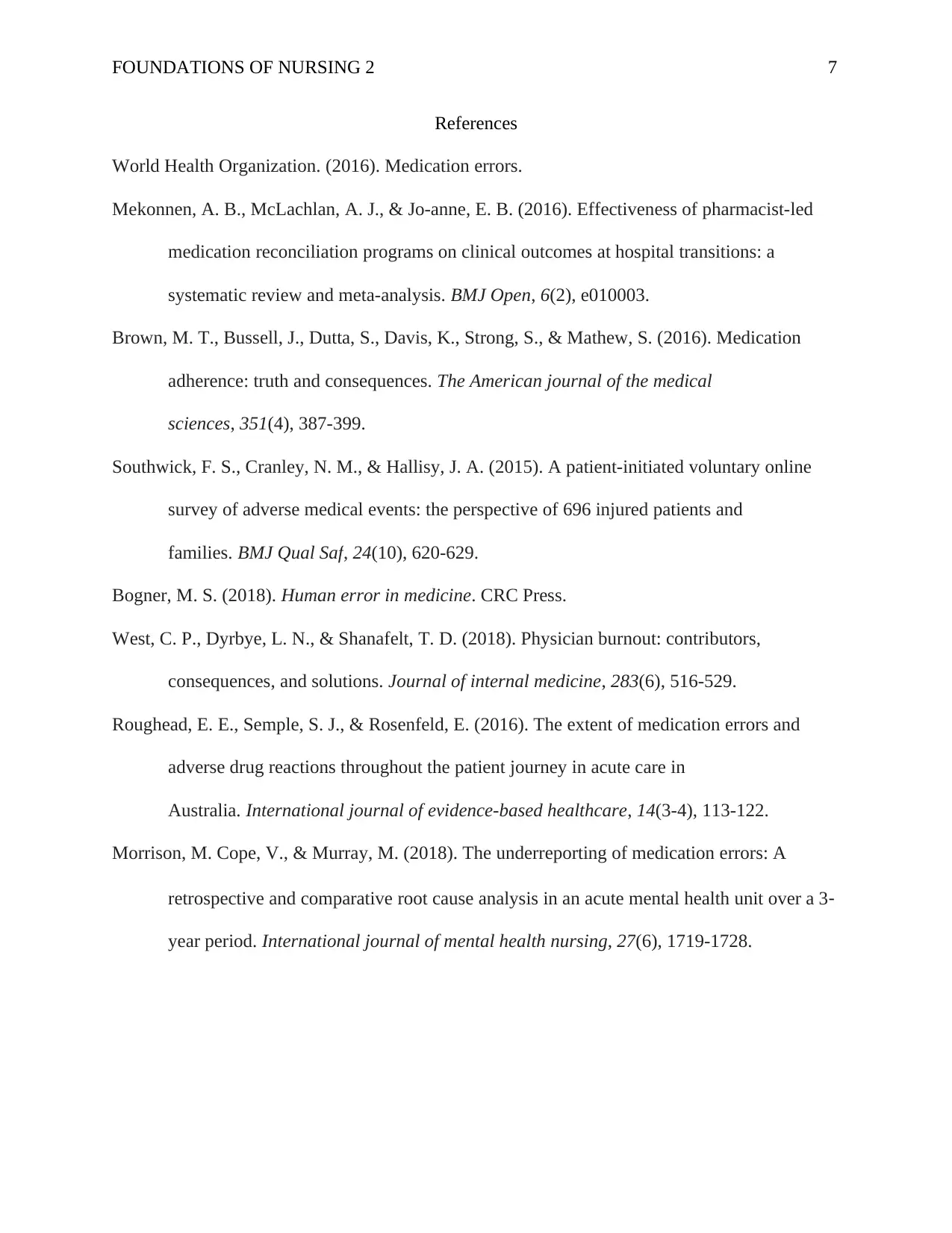
FOUNDATIONS OF NURSING 2 7
References
World Health Organization. (2016). Medication errors.
Mekonnen, A. B., McLachlan, A. J., & Jo-anne, E. B. (2016). Effectiveness of pharmacist-led
medication reconciliation programs on clinical outcomes at hospital transitions: a
systematic review and meta-analysis. BMJ Open, 6(2), e010003.
Brown, M. T., Bussell, J., Dutta, S., Davis, K., Strong, S., & Mathew, S. (2016). Medication
adherence: truth and consequences. The American journal of the medical
sciences, 351(4), 387-399.
Southwick, F. S., Cranley, N. M., & Hallisy, J. A. (2015). A patient-initiated voluntary online
survey of adverse medical events: the perspective of 696 injured patients and
families. BMJ Qual Saf, 24(10), 620-629.
Bogner, M. S. (2018). Human error in medicine. CRC Press.
West, C. P., Dyrbye, L. N., & Shanafelt, T. D. (2018). Physician burnout: contributors,
consequences, and solutions. Journal of internal medicine, 283(6), 516-529.
Roughead, E. E., Semple, S. J., & Rosenfeld, E. (2016). The extent of medication errors and
adverse drug reactions throughout the patient journey in acute care in
Australia. International journal of evidence-based healthcare, 14(3-4), 113-122.
Morrison, M. Cope, V., & Murray, M. (2018). The underreporting of medication errors: A
retrospective and comparative root cause analysis in an acute mental health unit over a 3‐
year period. International journal of mental health nursing, 27(6), 1719-1728.
References
World Health Organization. (2016). Medication errors.
Mekonnen, A. B., McLachlan, A. J., & Jo-anne, E. B. (2016). Effectiveness of pharmacist-led
medication reconciliation programs on clinical outcomes at hospital transitions: a
systematic review and meta-analysis. BMJ Open, 6(2), e010003.
Brown, M. T., Bussell, J., Dutta, S., Davis, K., Strong, S., & Mathew, S. (2016). Medication
adherence: truth and consequences. The American journal of the medical
sciences, 351(4), 387-399.
Southwick, F. S., Cranley, N. M., & Hallisy, J. A. (2015). A patient-initiated voluntary online
survey of adverse medical events: the perspective of 696 injured patients and
families. BMJ Qual Saf, 24(10), 620-629.
Bogner, M. S. (2018). Human error in medicine. CRC Press.
West, C. P., Dyrbye, L. N., & Shanafelt, T. D. (2018). Physician burnout: contributors,
consequences, and solutions. Journal of internal medicine, 283(6), 516-529.
Roughead, E. E., Semple, S. J., & Rosenfeld, E. (2016). The extent of medication errors and
adverse drug reactions throughout the patient journey in acute care in
Australia. International journal of evidence-based healthcare, 14(3-4), 113-122.
Morrison, M. Cope, V., & Murray, M. (2018). The underreporting of medication errors: A
retrospective and comparative root cause analysis in an acute mental health unit over a 3‐
year period. International journal of mental health nursing, 27(6), 1719-1728.
1 out of 7
Related Documents
Your All-in-One AI-Powered Toolkit for Academic Success.
+13062052269
info@desklib.com
Available 24*7 on WhatsApp / Email
![[object Object]](/_next/static/media/star-bottom.7253800d.svg)
Unlock your academic potential
Copyright © 2020–2026 A2Z Services. All Rights Reserved. Developed and managed by ZUCOL.





